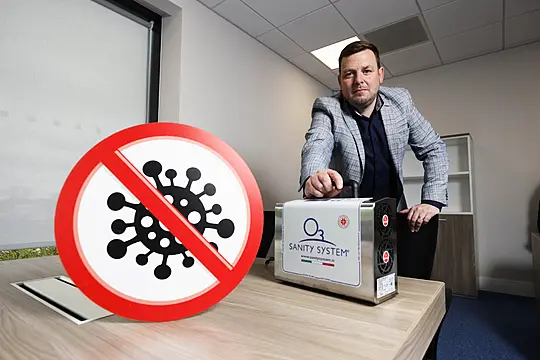Employers need to improve the air quality of their offices or risk employees resisting a return to their workplace, according to a sanitisation expert.
David Byrne, managing director of Dublin-based firm Sanity System, said dusting or vacuuming “doesn’t cut it any more” and more stringent hygiene practices are now required to limit the spread of Covid-19.
He believes office and retail business owners now have an increased duty of care to provide their staff with a healthy work environment once they return to their workplace.
There is a major onus on firms and schools to provide clean air for staff, customers and students
His comments come after research by employers’ group IBEC showed more than three-quarters of businesses are planning to return employees to their workplaces in the next three months if permitted under Government guidelines.
Public health advice remains that people should continue to work from home unless necessary to attend in person, but a partial end to remote working is expected in the coming months as more of the population are vaccinated against the virus.
Responsibility
Mr Byrne told the PA news agency: “After 15 months of hand hygiene and social distancing, people’s safety expectations have grown, so there is a major onus on firms and schools to provide clean air for staff, customers and students.
“As most buildings are not built with sanitisation in mind, business owners will have to take responsibility for the air inside their premises, and demonstrate their commitment to true cleanliness.
“A cleaner simply dusting or vacuuming a school, shop or restaurant doesn’t cut it any more and employees and consumers are likely to vote with their feet if they do not feel safe.”
The firm’s machines use ozone gas, a natural gas, to purify the air and surfaces of workplaces or vehicles.
It then removes any remaining air in so that the room, office or vehicle can be used as soon as the process finishes.
They can either maintain the hygiene standards they had pre-Covid or raise the bar
Mr Byrne said the machines are used by gardaí and the National Ambulance Service as well as in a multitude of business settings.
“Typically, in any closed environment there is a bacterial load that builds up during the day,” Mr Byrne said.
“Once we insert the system and allow it to work, it reduces it to zero. It just sits in a room, there is no labour involved.
“People running businesses and schools have a choice – they can either maintain the hygiene standards they had pre-Covid or raise the bar, like so many other sectors have, not only to re-open but to stay open.
“That applies whether you manage an office, school, shop or a children’s play centre; it means people can return to the working and leisure lives they had before, but with a higher degree of confidence.”







